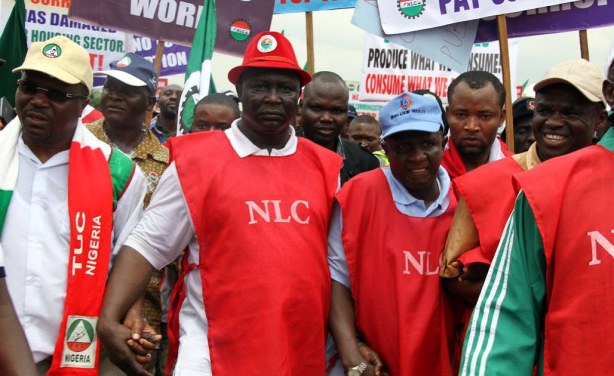The Nigeria Labour Congress (NLC) has suspended its planned nationwide protest over petrol subsidy removal scheduled for January 27 and February 2, 2022.
Addressing journalists in Abuja Tuesday, January 25, Ayuba Wabba, NLC President said the union decided at its national executive council meeting to suspend the strike based on the federal government’s decision to halt subsidy removal on petroleum.
The Federal government had on Tuesday proposed an 18-month extension for the implementation of the Petroleum Industry Act (PIA). This means that the government will continue to cater for petrol subsidy payments.
Read also:
- NLC Opposes bill seeking to ban strike in health sector
- NLC Set to confront FG’s planned Fuel subsidy removal
- NLC, Petroleum Minister Differ On Fresh Fuel Hike
Wabba said members of the NLC would be demobilised following the decision to suspend the protest.
“Following the reversal and reapproach by government, the National Executive Council of the Nigeria Labour Congress met this morning (Tuesday) virtually to consider the new position of the government,” he said.
The NEC after vigorous debates took a decision to suspend the planned nationwide protest scheduled for January 27, 2022, and the national protest scheduled for February 2, 2022.” he said.
FG extends fuel subsidy removal by 18 months
Meanwhile, the Federal Government says it is proposing to extend the subsidy removal implementation period by another 18 months.
Minister of State for Petroleum Resources, Timipre Sylva, disclosed this to State House Correspondents on Tuesday during a special briefing on fuel subsidy organised by the Presidential Communication Team at the Presidential Villa, Abuja.
According to him, the extension will give all stakeholders time to ensure that the implementation is carried out in a manner that ensures all necessary modalities are in place to cushion the effect of the PMS subsidy removal, in line with prevailing economic realities.
The Minister explained, “We don’t intend to remove subsidies now. That is why I am making this announcement. We also see the legal implication. There is a six-month provision in the PIA that will expire in February and that is why we are coming out to say that before the expiration of this time, as I said earlier, we will engage the legislature.
“We believe that this will go to the legislature, we are applying for amendment of the law so that we would still be within the law.
“We are proposing an 18-months extension but what the National Assembly is going to approve is up to them. We would approve an 18-months extension and then it is up to the National Assembly to look at it and pass the amendment as they see it.”
About a possible gradual increase in fuel prices in the coming months, he said “that is not on the table as well. Gradual or increment in whatever guise is not on the table.
“We are going to see how to rejig the law, this is not going to be the only amendment to the PIA. A few months ago, the President already proposed an amendment to the law.”
Asked if the extension has any links to the 2023 general elections, the Minister said “Of course not. This is just the human face of the Government and the President.
He wants everything to be in place and he insisted that if we want to remove fuel subsidies, we must make sure we put every measure in place to protect Nigerians.
“That is the President’s insistence. We are now taking steps to ensure that these processes are in place. And this entails talking with labour. We are already talking with labour and our discussions are around palliatives and mitigations.”
Sylva also said the queues experienced at the petrol filling stations across Abuja are man made. He explained that “this is not natural. When people are expecting a certain policy direction, they want to take steps on it. Some want to profiteer and then they start to hoard.
“Some want to stuff enough PMS in their homes so that whenever there is an announcement, they have enough in storage. So, all these inform the reason for panic buying and hoarding. That’s why the Government is coming very clear that this is not on the cards. We are not contemplating this policy direction.”

